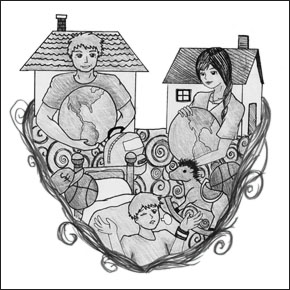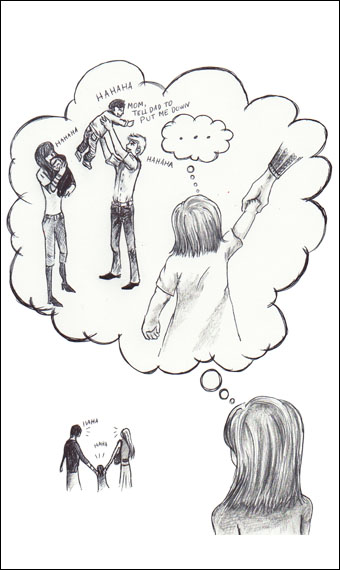

“You can’t blame yourself. [Divorce] just happens between two people,” says sophomore Marina Chavez. As the divorce rate in America is about 50 percent, many students face the aftermaths of divorce.
There are countless effects of divorce, but one of the most prevalent issues that students must adjust to is joint living. Chavez, whose parents are divorced, typically spends the week with her mother and weekends with her father. “With two rooms, you have to clean twice as much,” says Chavez.
Reflecting on her transition between houses, sophomore Lauren Pon says “It’s tiring. As soon as you get comfortable you have to switch back.”
Sophomore Andisheh Kabiri faces a similar situation when she goes for visits with her dad, “I get home from school on Tuesdays, pack my stuff, and then I can’t do much right away. We converse since we haven’t seen him for four days and eat dinner. It pushes homework back an hour and a half. It definitely pushes my time management.”
Another matter that students face is the commute between houses. “When I was little it didn’t really affect me that much, but as I grew up it affected me more because I had to commute,” says Chavez. “It’s harder for me because it’s two hours in the car to get there, so that’s four hours of my weekend.”
Kabiri says of her scheduled visits with her dad, “We have to miss things. If our friends want to hang out and we have scheduled with my dad, we have to miss it [hanging out], social events with my mom’s side of the family.”
While some divorces drastically alter a teen’s life, others are minimally impacted by their parent’s divorce. “The divorce happened in fifth grade and I didn’t really know my dad, so it didn’t really affect me,” says sophomore Kelly Chang.
Those who live with only one parent and do not have to switch between houses face other unique situations. Chang, who lives with her mom, says “There is less pressure for school, and it’s more self-motivation since I don’t have two parents pushing me.”
Divorce affects students on many levels, but how do these students cope with the divorce? Pon says “Initially I got depressed for a while to the point where I couldn’t go to school. At first I just talked to people. After a while you know you’re still the same person, you have to keep on going on and they’re still your parents.”
Others find comfort in the arts. Kabiri says “A month after the divorce, I started dancing. People say that dancing is a way of creative expression. Not to be cheesy, [but] it is. It’s like acting in a way, you get to be who you want to be when you dance.” “If I get into a fight with my dad, usually I sit at the piano for four hours and just crank out a song that reflects my emotion.”
“I was kind of lucky my parents split up when I was younger. Growing up I thought it was normal for my parents to be apart. It affects people more when they’re older,” says Chavez.
Over time, students find themselves adjusting to their new lifestyles. “Living in two places is easier. I can’t imagine my parents being back together or what it was before,” says Pon.
Sophomore Alexandra Griffis says “It was weird not seeing my dad every day and being able to talk to him. I got used to not seeing both parents every day and it’s just another thing in my life [now].”
“Time has made it crazy easier to get through, easier to deal with, easier to talk about; it was [initially] hard to express how I really felt about divorce. It’s a lot easier [now] to look back and say ‘It’s okay that my parents are divorced. It’s not the end of the world,’” adds Kabiri.
In light of so much change in one’s life, one must also become accustomed with new ideas such as celebrating their birthday twice. “We get to have two Christmases and two birthday celebrations,” says Freshman Eve McNally. “I get to spend some one-on-one time with each of them [my parents] and get to bond,” says Chavez.
Kabiri concludes, “[Divorce] is like the quote ‘What doesn’t kill you makes you stronger,’ in my case – like what other people are going through, what I’m going through, what my sister’s going through.”



